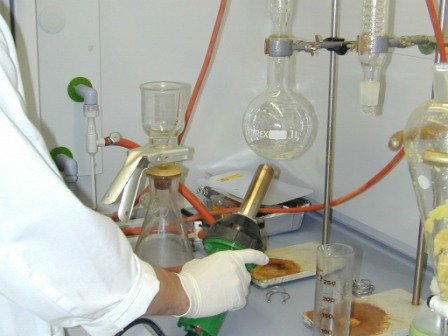Chemistry CLEP
Free Study Guide

Name of Exam: Chemistry CLEP
Number of Questions: 75
Time Limit: 90 Minutes
ACE Recommended Passing Score: 50
Practice Test Available?: Yes - Click here
Cost: $80 + Sitting Fee (Usually no more than $20) at your testing site. Military can take CLEPs for free with Tuition Assistance. Check with your Educational Officer!
Difficulty 1-5 : 5
(One being the easiest, and five being the hardest)
Exam Description:
The Chemistry CLEP covers the material commonly found in a one year college Chemistry course. You'll be expected to understand reaction types, equilibrium, kinetics, states and structure of matter, stoichiometry and equations..
Important! - Both a calculator and periodic table are available for use with the Chemistry CLEP. These are built into the testing software if you're taking a computer-based test. If you are taking a paper test, you'll need to make sure the testing center knows that you are allowed to use these items.
Personal Thoughts:
I don't see too many people attempting this without a firm grasp of Chemistry. I'll even go so far as to warn you that your high school chemistry knowledge will not get you a passing grade. This is a six credit CLEP exam, and like the other six credit exams covers a full year of college level information.
With that out of the way, the Chemistry CLEP can be passed provided you bring some Chemistry knowledge to the table and dedicate enough time to fill in the knowledge gaps.
Another important point to note - If your degree plan requires a science lab, this will not fulfill that requirement for many colleges. You'll need to speak to your student advisor, but it's something you'll want to check on before you dedicate the time to study.
Exam breakdown:
According to the College Board website, the Chemistry CLEP is broken down as follows:
| 20% | Structure of Matter |
|---|---|
| 19% | States of Matter |
| 14% | Descriptive Chemistry |
| 12% | Reaction Types |
| 10% | Equations and Stoichiometry |
| 09% | Experimental Chemistry (Lab Questions) |
| 07% | Equilibrium |
| 05% | Thermodynamics |
| 04% | Kinetics |
Areas of Study
I'm going to break down the percentages above with the topics that fall under each category. This should allow you to decide what you need help with, and only study those areas in which you feel a little weak. Less wading through masses of resources, and more targeted studying.
Chemistry 30 Online Textbook - One of the best online Chemistry textbooks that I've found for free. If you ever need any more information on one of the below topics, check this one for a more in-depth explanation.
I'd also recommend the The Khan Academy as a video resource for this exam. Covers virtually every subject you'll need in small, excellent video lectures. It has some good videos for studying the Chemistry CLEP as well.
Structure of Matter
(20% of the Chemistry CLEP)
- Atomic theory and atomic structure
- Evidence for the atomic theory
- Atomic weight and atomic mass
- Determination of atomic masses
- Isotopes - This actually covers Atomic Numbers, Mass Numbers, and Isotopes in a clear fashion.
- More Atomic numbers
- More Mass Numbers
- More Isotopes
- Mass Spectroscopy
- Electron Energy Levels- A very interesting (and well-done) video tutorial on this subject. Check out his other videos if you're running into problems with other subjects.
- Atomic Spectra
- Quantum Numbers
- Atomic orbitals
- Periodic Relationships
- Atomic Radii
- Ionization Energies
- Oxidation States
- Chemical bonding
Binding forces
Types:
- Covalent
- Ionic
- Metallic
- Macromolecular (or network)
- Dispersion - Know the three different types. Follow the links on the main page.
- Hydrogen bonding
- Relationships to structure and to properties - A fascinating read, even for a Chemistry dunce such as myself.
- Polarity of Bonds
- Electronegativities
- Geometry of Molecules
- Ions
- Coordination Complexes
- Structural Isomerism
- Dipole moments of molecules
- Relation of Properties to structure
- Molecular Models
- Valence Bond Theory
- Hybridization of Orbitals
- Resonance
- Sigma
- Pi Bonds - Has a link that covers Sigma bonds in more detail as well.
- Molecular Orbital
Nuclear Chemistry:
States of Matter
(19% of the Chemistry CLEP)
- Gases
- Laws of ideal gases
- Equations of State for an Ideal Gas
- Kinetic-Molecular Theory
- Avogadro's number
- Boltzmann distribution
- Deviations from ideal gas laws
- Liquids and solids
- Liquids and solids from the kinetic-molecular viewpoint - Tons of great information in this book. I've linked directly to the liquids section but the solids are just below it. Check out the rest of this online book for any other subjects that are giving you a hard time.
- Phase diagrams of one-component systems
- Changes of state
- Critical Phenomena
- Crystal structure
- Solutions
- More on Solutions and Solubility
- Methods of expressing concentration
- Colligative properties
- Raoult's law
- Effect of interionic attraction on colligative properties and solubility - A decent explanation on interionic attractions when it comes to solutions.
Descriptive Chemistry
(14% of the Chemistry CLEP)
You may be asked some lab questions in this section. You'll also be asked to read graphs and the periodic table.
Relationships in the periodic table:
Reaction Types
(12% of the Chemistry CLEP)
- Covalent bonds
- Formation
- Cleavage
- Acid-base reactions - Read the entire page, including the Arrhenius definition. It touches on many of the following topics as well.
- Brønsted-Lowry
- Lewis
- Amphoterism
- Reactions involving coordination complexes
- Precipitation reactions
- Oxidation-reduction reactions
- Oxidation number
- The role of the electron in oxidation-reduction
- Electrochemistry
- Electrolytic cells
- Standard half-cell potentials
- Prediction of the direction of redox reactions
- Effect of concentration changes
Equations and Stoichiometry
(10% of the Chemistry CLEP)
Ionic and molecular species present in chemical systems
- Net ionic equations
- Stoichiometry
- Mass and volume relations with emphasis on the mole concept
- Balancing of equations, including those for redox reactions
Equilibrium
(7% of the Chemistry CLEP)
- Physical dynamic equilibrium
- Chemical dynamic equilibrium
- LeChâtelier's principle
- Equilibrium constants
Quantitative treatment
- Equilibrium constants for gaseous reactions in terms of both molar concentrations and partial pressure (Kc, Kp)
- pK
- pH
- Solubility product constants and their application to precipitation and the dissolution of slightly soluble compounds
- Constants for complex ions
- Common ion effect
- Critical Phenomena
- Buffers
Thermodynamics
(5% of the Chemistry CLEP)
First law:
- Heat of formation
- Heat of reaction
- Change in enthalpy
- Hess's law
- Heat capacity
- Heats of vaporization
- Heat capacity
- Fusion
- Free energy of formation
- Free energy of reaction
- Dependence of change in free energy on enthalpy and entropy changes
- Relationship of change in free energy to equilibrium constants and electrode potentials
Kinetics
(4% of the Chemistry CLEP)
- Rate of reaction
- Order of reaction
- Rate constant
- Effect of temperature change on rates
- Energy of activation
- The role of catalysts
- The relationship between the rate- determining step and a mechanism
Recommended bargain-priced study resources
Always check your library first! You may be able to find some of these for free. You don't have to buy the officially recommended resources all the time. If you're the type of person that prefers to study from a textbook source however, then please see below.
Cracking the AP Chemistry Exam, 2009 Edition (College Test Preparation) - My first recommendation for those who already have a firm grasp of Chemistry and just want to brush up. The Chemistry AP prep book covers the Chemistry CLEP better than most other resources, including those written specifically for the CLEP. It's a bit more difficult, but this is an exam where "too much" is better than "not enough". It doesn't hurt that it's only $12 too. ;)
Chemistry: Concepts and Problems: A Self-Teaching Guide (Wiley Self-Teaching Guides) - If Chemistry isn't your thing and you're looking to learn fast, then this is probably your best bet. My recommendation for the intermediate Chemistry CLEP taker. I'd still consider getting the AP book once you've read through this one. This will lay the groundwork, but the AP book will prepare you for the exam. Provides a good overview in an easy to read format.
Chemistry for Dummies - This is for the absolute beginner. If time doesn't matter, and you want to take some time to study for the Chemistry CLEP, then I'd start with this book. Once you've read it from cover to cover, you should be able to get through the AP book with little problems. Between the two of them, you'll be prepared for the Chemistry CLEP.
The Standard Deviants - Chemistry (3 Pack) - Last but not least, the DVD study option. Much like math, I find myself nodding off when I study for science exams. The videos do a decent job of keeping you engaged, and are a good alterative if even the Chemistry for Dummies book is putting you to sleep. I would recommend using the AP book as well once you make it through these DVD's. The book will prepare you for the exam. These videos will prepare you for the book.
InstantCert Academy - Chemistry Exam Feedback - There's only one page worth of notes on this exam, but one post is absolutely packed with good information about what was on his exam. You can find this is in the Specific Exam section of the forums which does require a subscription to Instantcert. I wouldn't subscribe to InstantCert for this exam alone, but if you're already a member or planning to take some more CLEP's then by all means check it out.
Also check out some of the other posts about this exam - Free Chemistry Resources. These are found in the free forum, and contain quite a few good resources to prepare for this exam.
If you don't know what InstantCert is, then click here for the scoop as well as a discount code: **InstantCert Academy**
You'll find an InstantCert link for every exam here if that gives you an idea of the amount of information they have available. It's an outstanding resource.
Closing Thoughts
The Chemistry CLEP has the reputation of being the hardest CLEP there is. Personally, I'd rather take this than the Calculus CLEP, but that's probably due to my hatred of math more than anything else. Regardless of my own preferences, it's a six credit exam so there's six good reasons to take your time and prepare well.
One last time just to drive it home - Make sure you've checked to see whether your college requires a lab to go with this course. If it does require a lab, then you may end up taking this exam for nothing. Most colleges will allow this to fill elective credits if nothing else, but there are easier CLEP exams out there you can use for that. If it is accepted for a Chemistry requirement, then what are you waiting for? Get those credits!
Best of luck!
Return from Chemistry CLEP to
the CLEP Exams Page
Or, you can head back to the home page with the below link
Return from Chemistry CLEP Study Guide to
the Free Clep Prep Home Page
